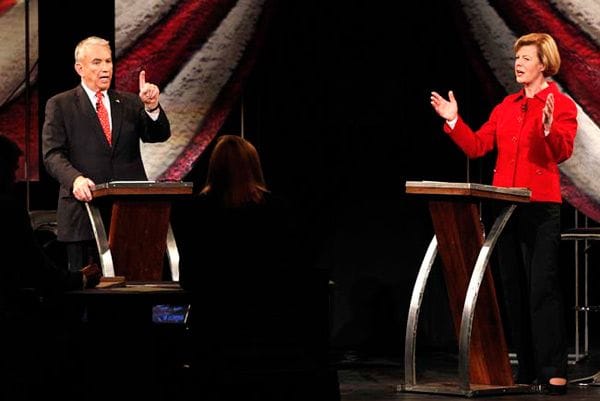Tommy Thompson and Tammy Baldwin Fighting for Independents

Credit: Leadertelegram.com

Both Tommy Thompson and Tammy Baldwin, fighting for the Wisconsin Senate seat, herald themselves to be advocates of the middle class, courting independent middle class voters in a race that appears, by most polls, to be nearly a dead heat, if slightly leaning in Baldwin’s favor.
Tommy Thompson, a Republican, was Wisconsin’s longest serving Governor, and served the George W. Bush administration as Secretary of the Department of Health and Human Services. Tammy Baldwin, a Democrat, was the non-incumbent winner of a seat in the House in 1998 and has the approval of the American Civil Liberties Union and Americans for Democratic Action.
Wisconsin is one of several swing states being heavily campaigned in for the presidency, and a win by Tammy Baldwin in the senatorial race could help tip the makeup of the Senate in the Democrats’ favor. A Democratic senate would help an incumbent Obama continue his plan of steady economic growth and invigorate of Obamacare, but would hinder the work of a victorious Romney in reigning in federal spending and fostering a business-friendly economic environment.
In this race, the focus has taken a turn in recent weeks from the economy and health care to national security, after Baldwin accused Thompson of questioning her patriotism in their last debate. Thompson retorted that he questioned her judgment, in a campaign which has become as rough and caustic as the presidential race.
Wisconsin’s senate race mirrors the presidential campaign in the battle between the incumbent's status quo in Thompson and new ideals and energy in Baldwin. The twist here is the old blood is Republican and the new blood is Democratic, in a state which is historically progressive (including progressive Republicans) and didn’t have a Democratic party until the 1950s.
Like other swing states, Wisconsin voters' concerns are varied and broad, but all voters are fixated on the national economy, unemployment, and federal debt. Independent voters are a valuable commodity in swing states, where they’ll be responsible for shifting the tide of incumbents versus challengers, or budget versus spending, while trying to re-grow employment and the economy.
Decided voters in Wisconsin mirror decided voters nationally: the majority of Democrats believe the economy has improved, while the majority of Republicans believe it has worsened.
Still, voters in Wisconsin lean slightly toward the Democratic choice for senate, despite the state’s unemployment rate of just over 7%, which is quite high. As the challenging candidate and a Democrat, Baldwin might have the edge with independent voters looking to side with pro-middle class values in the end.
Middle class values, especially jobs and financial security, seem to be swaying independent voters in Wisconsin. Like many independents on the national level, Wisconsinites look to fiscal responsibility followed by an economic prosperity that could be shared by all classes.



